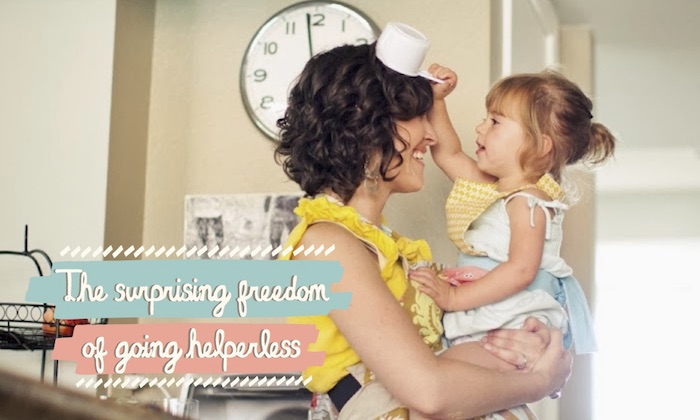
One mama who recently stopped employing a helper discovers that she loves it for very surprising reasons
“I couldn’t live without my helper”. Many a mama in Singapore has uttered those words, but mama of two Jennifer has discovered after some drama that she takes new pride in her housework and mothering skills now that she’s gone helperless. Here’s how she got there after an up-and-down year…
A year and a half ago I finally gave in to my husband, and we hired a live-in maid, because that is what you do in Singapore when you are overwhelmed with housework and have no semblance of a social life. I wrote about this previously on my personal blog when we first got our helper. I truly am thankful that it is quite affordable to have full-time help in Singapore, as it is not in other parts of the world.
Our first helper, I’ll call her C, was quite good. She managed everything I typically did around the house, along with the shopping. Though her cooking was not great, she could manage a recipe. Things that needed to be in the fridge were usually there. There were a bunch of small things being done incorrectly that drove me crazy, but whatever, I didn’t have to do it myself. With a baby in the house, she was a huge help. But she had to leave us.
She told us her son was not being cared for well by her alcoholic parents; she needed to return to the Philippines immediately. We agreed, and found a replacement helper within a week. Then she got EXTREMELY upset that we had found a replacement. It hurts, I suppose, when you have played such an integral role in a family, to have that role replaced quickly (but she asked us to!).
Cue the extreme levels of drama: neither the hubs nor I could speak with C without it getting heated (on her end). I often had to bring the kids outside so the hubs could speak to her about flights home and such. I even locked myself in the kids’ room with them on her last night as she was out of control (thankfully her agency calmed her down). With stories in the news about [isolated incidents] of helpers committing acts of violence against children, I wanted to be careful.
Cut to our new helper, D. She is very sweet and gentle, which was exactly what I wanted after the intensity of our situation with C. D is a great cook, great with the kids, and okay with the housework. But within a few weeks of working for us, she smacked Kiddo 1. She said it was a knee jerk reaction to Kiddo 1 kicking her in the shin (we had a MAJOR talk with Kiddo 1 about this) and that it would never happen again. I was sick to my stomach about this. Changing over a helper is no easy thing. The kids call her auntie, as they do all women out here, but she is their auntie. We told Kiddo 1 that C had to go home to help her own son, but Kiddo 1 still had terrible behavior before and after the change, so I know it affected her to have someone so central in her life just leave. To do that again would have ramifications. D was very apologetic, so we chose to give her another chance.
That never happened again, but something else changed: my ability to cope with motherhood times two. With Kiddo 2 becoming more manageable, I found it very difficult to accept help around the house. Things needed to be explained over and over, which can be typical. Helpers become helpers out of economic necessity; many do not have fantastic English skills, and some are not literate. This is all fine for someone with the patience to train a helper, but this is not me. I would rather quickly do something myself, just the way I want it, than explain a task over and over.
There is a huge divide, I find, between the way westerners live and the way a helper who comes from the countryside lives. Common sense is only common to those from the same culture. Take a recent illness, for example. Kiddo 2 got the flu, followed by the hubs, then D. But D didn’t tell me she had vomited twice that morning before interacting with the kids. She made them breakfast, got Kiddo 1 ready for school, and brought her to school (around others’ kids), played with Kiddo 2, then told me about it only once she felt she might pass out. I was quite upset at the thought Kiddo 1 might get it too, as we had tried our best to keep things contained. Of course if you are on your own at home and get sick, you have to manage the kids, but with help I expected to avoid situations like that. I truly don’t have the patience or desire to train someone extensively and explain how diseases are passed on and our personal priorities around this.
I also don’t want to be responsible for a stranger in my home any longer. We just paid thousands for very expensive dental work for D. She needed it, badly, and it is our responsibility out here to provide medical/dental treatments for her. She needed it because she is the sole supporter for her kids and sister back in the Philippines, and she needs to stay healthy. I am not sure how much she knows about taking care of herself, and it is very weird to talk to another adult about things like this. Part of why I no longer want a helper is because of the anxiety about what will happen next. And if she is unhappy about something? Will it affect the kids? Who knows?
It is one thing when a family member stays with you, as opposed to a stranger. What can I say? It makes me uncomfortable. I am anxious all the time at home, especially when she is upset and speaking Tagalog in her room loud enough for me to hear. Do I ask her if she is ok? Give privacy? Offer help? I am neurotic; I don’t know where to draw the lines. Many, many people in Singapore have helpers, but for me—right now—I just can’t.
Something else has changed too, though: I actually appreciate doing the housework right now. I am finding a pride in doing these things myself that I never had before. Ever. (I am shocked I just wrote those words.) In the past, I would have preferred to do ANYTHING other than hang laundry to dry, put it away, or wash dishes, floors, toilets, etc.
But dishes time is mental shut down time, and I love it now. It is a time when I can do a task well, and feel good and calm at its completion. My friend Murchelle shared a great and timely quote from Dr. Martin Luther King Jr that hits on this. “If a man is called to be a street sweeper, he should sweep streets as Michelangelo painted, or Beethoven composed music or Shakespeare wrote poetry. He should sweep streets so well that all the hosts of heaven and earth will pause to say, ‘Here lived a great street sweeper who did his job well.’” I truly felt pride last night while washing forks. It is an amazing perspective change, and I am thankful for it. The work never ends as a mother, and I have always wanted to enjoy it more.
I can see the reasons this has happened, psychologically speaking. I often talk about feeling unmoored out here in Singapore. Life almost doesn’t feel real. We are “doing life,” but it has a sort of temporary feel to it. Without a super engrossing full-time job, I have a little too much time to think, and frankly to notice all the things in my home that aren’t the way I want them. This is fine for someone who couldn’t care less; but I care, a lot. I care because of this unmoored feeling. Doing the work myself moors me to this Singapore shore, and to my kids and the hubs. I see them eat the food I prepare, and I feel joy in that. I see Kiddo 1’s hair up the in the ponytails I did for her; I see Kiddo 2 playing with the train track I set up for him. I see the clothes hanging up and know that I did that; I see a sparkling kitchen or bathroom and feel satisfaction. I want to actually and fully raise my kids and take care of them.
Maybe one day in the future I won’t feel this way anymore, but for right now, I am thankful the hubs is supportive of me giving it a try again all on my own. In a month or two I may wave the white flag and give up in desperation. But for now, I want to enjoy the peace of mind that comes with being alone in your own home, able to walk around looking like a mess without fear of judgement, without having to communicate with anyone first thing in the morning, and without having to worry about the needs of a stranger in my home.






 View All
View All




 View All
View All











 View All
View All




